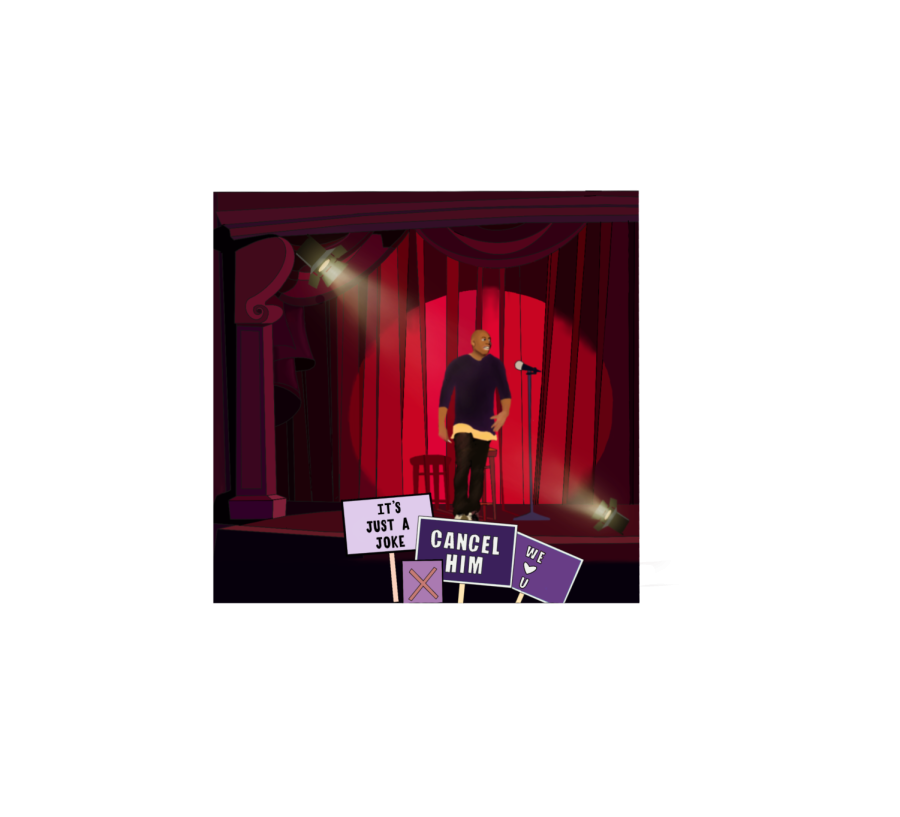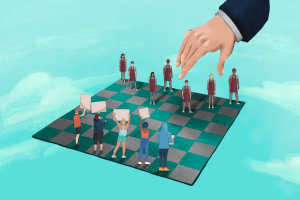Dark side of dark comedy
Graphic illustration by Surya Saraf and Alyssa Wang
Dave Chappelle, famous comedian, came under fire for his transphobic comments, which have sparked backlash from multiple communities. Graphic illustration by Surya Saraf and Alyssa Wang.
May 8, 2023
The phrases “it’s just a joke,” or “why are you so upset?” regularly pollute social media in light of outrage concerning yet another comedian’s controversial humor. What can often begin as offense-driven dislikes and comments soon quickly tumbles into a snowball of death threats and intense harassment. Can their response be justified?
Considering the large influence comedians can have, they should be held accountable by consumers and streaming companies for jokes that can harm communities through skewed factual inaccuracy or biases, regardless of whether they’re disguised as dark humor or not. Similarly, critique against comedians should be constructive, rather than attempting to censor a comedian’s speech because repetitive harsh criticism can push comedians even further from self-evaluation.
There’s no mistaking the incredible things comedians have continued to achieve through their performances — for instance, Jon Stewart’s advocacy for 9/11 responders and survivors health care funding through “Never Forget the Heroes: Permanent Authorization of the September 11th Victim Compensation Fund Act,” passing after Stewart pledged his support to the bill in a scathing televised address against apathetic congressmen, mounting pressure on lawmakers. Or in the case of George Carlin, his sets about America’s temporary privileges, resurfacing in the wake of the Supreme Court’s decision to overturn abortion rights in the U.S., sparking widespread conversation and discussion about the merits of the court’s decision.
Because of their large followings and accessible conversation-style speech, comedians can make complex political and social issues more digestible and engaging, especially in comparison to the dronings of painfully uncharismatic politicians, or jargon-filled newspaper articles. However, this means comedy also has the potential to do harm to marginalized communities. When comedians slip up or intentionally spread misinformation, these statements can be amplified through the media and cause ripple effects — low self-esteem and wavering acceptance within people, especially in youth.
It’s getting increasingly easy to step onto a stage and get messages spread across the internet, such as when Dave Chapelle did a set where he ridiculed transgender people or Jimmy Fallon’s blackface skit on Saturday Night Live. These comments and actions on stages are especially dangerous because of their potential to become widespread and eventually encourage or sanction hateful acts. Chapelle’s messages can potentially impact transgender people and youth by influencing the American public to adopt negative perceptions of transgender individuals. By pushing these videos to television and beyond, subconscious messages can cause these “jokes” to become normalized in everyday scenarios, relaying harmful stereotypes and misinformation.
“Comedians in today’s society have the role of being social or political commentators,” junior Peter Aguirre said. “They also have larger audiences and as consumers, we constantly absorb their messages every time we engage in media.”
Because of this, a lack of feedback or criticism allows comedians to fall into the excuse of “it was just a joke.” This blanket statement enables a cycle of insensitive or inflammatory jokes to be brushed off as insignificant, while the number of communities hurt will keep growing. An 2016 American Psychological Association study on ethnic and racial teasing, found that even ethnic and racial teasing considered harmless caused increased and persisting social anxiety in adolescents.
Although it is important to hold comedians responsible for the words they say, criticism through mediums like cancel-culture are not productive in fostering change in comedians. While it’s difficult to hold respect for someone who has displayed a staggering lack of it, criticism should be civil and not degrading — allowing the feedback to actually reach the comedian. This can even take the form of simply not laughing at a joke. After all, death threats and slurs through social media will often result in nothing but an eye roll or getting blocked, and may even embolden them to integrate even more extreme views and jokes into their sets.
“If my brother told a joke that I thought was insensitive or racist, I wouldn’t react. I’d say ‘That’s not funny, try again,’” Spanish teacher Michael Esquivel said. “If you’re a comedian, that means you’re constantly working on your craft.”
Often, the fine line between constructive criticism and attacks through cancel culture is hard to detect, as cancel culture is argued to both be someone’s free speech and while having the potential to harm the speech of others. Regardless, it’s good to set groundwork towards informative comments, rather than ones that immobilize comedians from speaking entirely.
“Extreme cancel culture is a dangerous road to go down,” librarian Amy Ashworth said. “If you look hard enough you will eventually find dirt on everyone.”
Although the appeal for many people coming to comedy shows is to listen to unfiltered dialogue, which can be refreshing compared to sugar-coated corporate media, this art form doesn’t take away from the implications and responsibilities comedians hold as public figures. Because of accessible and engaging storytelling and casual speech comedians produce, consumers are more likely to relate or internalize the message being said. Especially when a comedian is talking about groups or stereotypes that they aren’t a part of — they should be more open to taking feedback, instead of labeling people ‘offended snowflakes’ or overly sensitive.
“Calling someone sensitive is a pretty silly way to handle critique and in itself is belittling,” Ashworth said. “Talk to me about what it is that you think I’m too sensitive about.”
No one can deny the immense positive impact comedians and comedy can have on modern society and media, but it’s important for listeners to continue to voice their opinions respectfully, and for comedians to keep open ears and minds when dealing with criticism.




























































